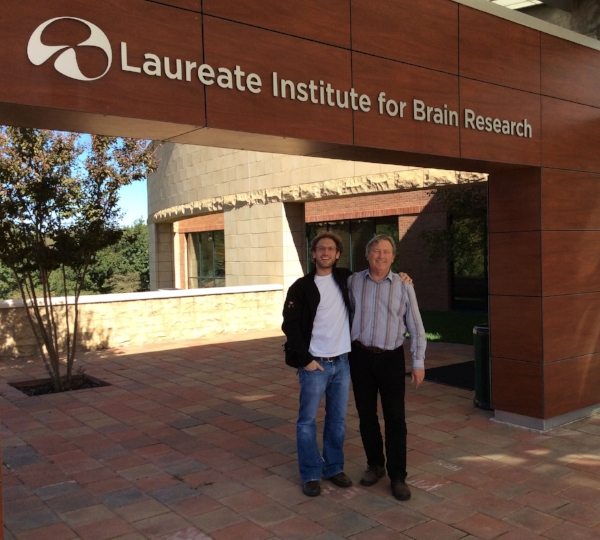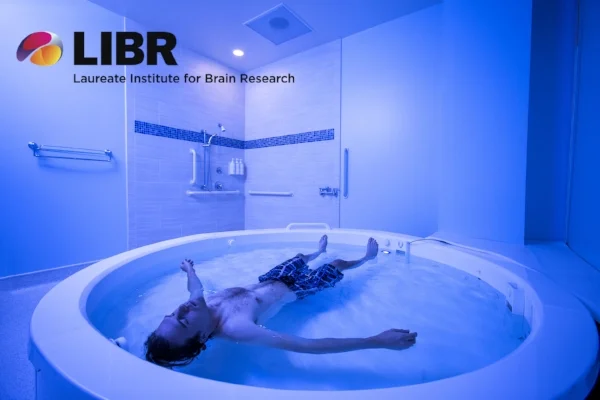Colin and Justin at LIBR
Everyone in the float world has been waiting to see the publication of the paper by Dr. Justin Feinstein of the Laureate Institute for Brain Research (LIBR) in Tulsa, OK and, at last, the great day has come.
This publication is important because it is the first peer-reviewed study of floatation using the special round, open pool and secondly, it is the first publication looking at a clinical population with PTSD, panic disorder, and other manifestations of anxiety. (A recent Swedish paper covered generalized anxiety.) It follows the pioneering work that Dr. Feinstein did on healthy people using fMRI to study their brains before and after floating.
In that earlier project, he was able to find significant brain changes in people who floated versus people who were just resting in a comfortable chair. The evidence of actual brain changes is the clinical step we all wanted to see to demonstrate that floating is a very special state of relaxation (that paper will come later).
Now, for the first time ever in a clinical study, 50 anxious people floated for a single float session. Normally, these people would not go near a commercial float center because their anxiety, in its many forms, would make it difficult for them to consider such an experience. Astonishingly, every single participant found significant improvement in how they were feeling after just one float session.
Even more remarkable, is the fact that the more severe their anxiety, the more relief they experienced and reported. To get that degree of success and to have all of them report significant improvement, is a wonderful testament to the potential for the clinical use of floating and, of course, for the power it has for everyone to achieve profound, brain changing relaxation.
Floatation therapy is the ultimate non-invasive, non-drug induced way to achieve profound relaxation.
It is very moving to learn that some of those subjects felt "they got their life back" or that they found more improvement than gold-standard drug therapy was providing. And this was from a single float session, an hour or so of floating peacefully but in monitored, carefully calibrated conditions.
Let us be clear that nobody wants to see self-referring anxious people choose floatation without the skillful preparation for what they can expect. Further research and replication of these wonderful results in clinical settings with the right supervision and support for vulnerable people are needed.
We also do not want to suggest that you have to be suffering from anxiety to get the benefit of a float session. But rather these results emphasize what a powerful tool the float tank can be in all of our lives.
When the body relaxes, the brain relaxes and this can produce profound changes which make us feel differently. The experience of floating is almost always positive and encourages the natural healing abilities we all have locked up in our cells.
We, at Floataway, are honored to be associated with LIBR by providing the equipment, the large Open Floataround pool, which is being used in the research. We emphasize that we had no influence over the research and we do not sponsor the research in any way.
The Open Floataway pool at LIBR
Dr. Feinstein, in his discussion, expressed that he feels the round, open pool with its welcoming aspect, comfortable environment and hand wave-light control were important for these anxious subjects. It may be essential to replicate those features in further research studies.
Floataway is committed to being a supplier of advanced floatation equipment for clinical and research purposes, especially the round, open pools because we know from commercial experience that first-time floaters often prefer this style.
Colin Stanwell-Smith
Floataway Owner










